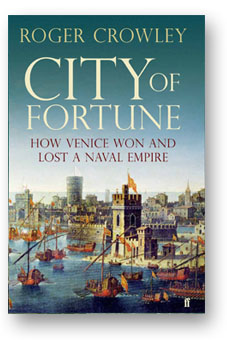A well-written and engrossing account of the rise and decline of the Venetian empire
As this year’s birthday present from my wife, I will be receiving in the post one book every month from Daunt Books, selected personally by their staff, based on the things that interest me. The first book to arrive was City of Fortune, by Roger Crowley, the story of “How Venice won and lost a naval empire”
Venice grew from a small settlement built on marshy islands in a lagoon, to become a wealthy trading city, controlling much of the trade between East and West. This was inextricably linked with sea power, and Venice was in the middle ages the greatest naval power in Europe and the Mediterranean. There are lots of books about Venice, but I don't know of any other popular (i.e. non-academic) histories that tell the story of the Venetian maritime empire.
The book covers the period from around 1000 to around 1500. In the early years, the Venetians subdued the pirates around the Adriatic and became the dominant naval power in their area. Then in the early 1200s they got involved in the notorious Fourth Crusade, when they were engaged to transport the crusaders to the Holy Land. As part of the deal, they stopped along the way of to reassert their authority over their possessions in the Adriatic. As a result of various intrigues, involving rival claimants to the Byzantine throne, the crusader force ended up at Constantinople, at that time the greatest and richest Christian city on earth. Constantinople was attacked, sacked and plundered in 1204. The crusaders never made it to Jerusalem. The Byzantine Empire was fatally weakened, while Venice became rich on the loot, acquired more colonies, and became even more powerful.
It goes on to tell the story of how the Venetians overcame other rivals in the Mediterranean, notably the Genoese, who came close to conquering and occupying Venice itself. Ultimately Venice triumphed. Although the Genoese were more than a match for them militarily, the Venetian state was better organised and more stable, which made all the difference in the long run. Then the Ottoman Turks became the dominant power in the Mediterranean and by the 1500s, the days of Venetian naval supremacy were over. Venice would still be prosperous for many years, until Napoleon invaded in 1797, but the days of glory were over, and the slow decline had begun.
The book is written in a fast-paced style, at times almost like a novel, and I found it an easy and entertaining read. Incidentally, although it might look like a naval history, it's aimed at the general reader, not the naval enthusiast. There were several things about it which made an impression on me.
I had known the story of the Fourth Crusade in outline. The Venetians were at that time the only people with the resources to transport a large crusader force by sea across the Mediterranean However I had not appreciated the extent to which for Venice it had been such a high-risk undertaking. More or less the entire economy of the Republic had to be diverted towards the enterprise.
I knew of the Venetian possessions in the Mediterranean, which even today have Venetian buildings and clock towers, and which display the winged lion of St Mark, the emblem of Venice. However, I had not appreciated how badly the local inhabitants in their colonies were treated. We are often told how, compared to the chaotic despotism elsewhere in Italy, Venice was a model of enlightened good government (for that time). This did not apply in their colonies, which were regarded as purely economic and military resources. In their colony of Crete, the Venetians were hated by the locals. There were frequent revolts, which were put down harshly.
We live in troubled times today, with unpleasant conflicts around the world, in which innocent civilians are bombed and killed. Reading this book reminded me that things in the past were much worse. They may not have had the means to wreak death and destruction on a massive industrial scale as we do today, but they were pretty horrid. Wholesale massacres seem to have been the norm during warfare. Torture was accepted as routine. Prisoners captured by the Turks might be impaled or sawn in half. Turkish pirate chiefs who were captured by the Venetians were roasted alive at the end of an oar.
We might talk of cut-throat business practices, but this was often literally true for merchants in the middle ages. Life for them could be dangerous, with the constant threat of piracy at sea, periodic fights between merchants from different countries, and the risk of imprisonment, or worse, if they were abroad when the political climate changed. Being an aristocrat was no protection. Venice in the middle ages might have been one of the richest and most powerful states, but even for the well-off, things were pretty tough and precarious.
City of Fortune: How Venice won and lost a naval empire, by Roger Crowley.
http://www.rogercrowley.co.uk/city.htm
http://www.rogercrowley.co.uk/city.htm
This the sort of subscription I received for my birthday:
https://www.dauntbooks.co.uk/products-page/subscriptions/
https://www.dauntbooks.co.uk/products-page/subscriptions/

No comments:
Post a Comment